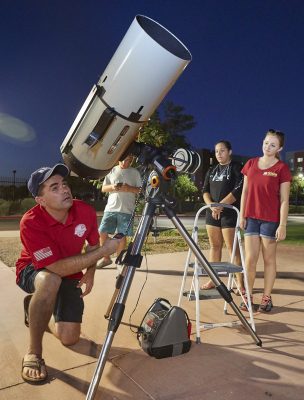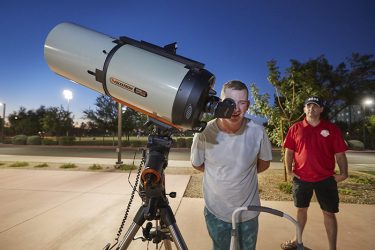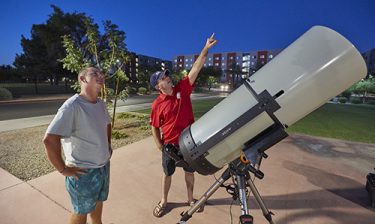
Story by Ryan Kryska
Photos by David Kadlubowski
GCU News Bureau
When light fades and stars shine, Brent Phillips is at peace. But it wasn’t always that way.
Phillips, a 36-year-old Honors College senior at Grand Canyon University, had his future stolen from him.
The Marine had plans to put 20 years in with the U.S. Armed Services before starting a career in law enforcement. He wanted to follow the multiple generations of his family who have served the San Bernardino, Calif., community.
That is what he was supposed to do. That is who he was supposed to become.
But God had other plans.
Kris Phillips, Brent’s mother, cries through her words when she talks about what happened to her son. But she’s so proud of what he’s doing now -- operating a solo astronomy outreach aimed at easing veterans’ stress and sparking children’s interest in science and math.
“He shouldn’t have survived what happened to him, but by the grace of God he did,” she said. “He was lost and he was trying to find something more permanent than himself, something that justified himself. He felt that he owed it to other people and other soldiers and other Marines to help them come back from the brink.
“I think looking at the stars helped him.”

Losing sight
In 2003, Phillips was among the “first across the berm” in Iraq. He was ambushed in a city outside of Baghdad -- hit with four rocket-propelled grenades and a bullet in the arm. He lost an eye, was discharged and was told he could never work in law enforcement because of his physical and emotional injuries.
Phillips had dropped out of high school to join the Marines. He had no backup plan. His life, as he knew it, was over.
All he had to pick up the pieces was his General Education Diploma. So he enrolled at a community college with aspirations to work with the Kepler Space Telescope Program, but his traumatic brain injury prevented him from being able to do the necessary complex math.
“It wasn’t fair to me or the taxpayers because they were paying my college at the time,” he said. “So I bailed out and found a way to tie history into the astronomy. I can teach about Aristotle but I can also show it in a way that the students are connected to it because they are looking at the same stars that he was looking at.”
Phillips switched gears to become a history teacher and transferred to GCU, which he says is the only university in the state that offers the setting he needs to thrive.
“When I got here, I realized that this school had a very large veteran community,” he said, “and that helps me out a lot because I was able to go to the vet center and kind of work with other people who are in the same boat I am. Some of us are injured. Some of us are just out of the military and want to get the schooling done.”
The combination of GCU’s smaller class sizes and the veteran support was just what Phillips needed.
“And here, I’ve just been excelling,” he said, adding that his mom thought he was joking when he told her he made the dean’s list. “To be in honors is actually kind of an oddball for me.”

A portal to the past
Phillips calls his telescope “a portal to the past” because stars are so far away that what the eye sees is actually a snapshot from hundreds of thousands to millions of years ago.
“It’s amazing to be able to take pictures of things that are millions of light years away,” Phillips said. “And because of the technique that’s needed to do it, the only thing you can really think about is what’s going on at that time.”
Kris Phillips said her son has always had an “interest in really unique things.”
“He would get so involved in them that he would just talk about them constantly and learn about them so in depth that his teachers would actually give him time in class to teach it,” she said. “So he has kind of been a teacher since he was little.”
Astronomy, however, has become more than just a childhood fad. It started as a way to curb his post-traumatic stress disorder and blossomed into a purpose when he was hired at the Challenger Space Center as a weekend manager.
“So I started helping out with my friends outreach and I was just like, ‘I like this. This is peaceful to me,’” he said. “So I ended up buying my own scope.”
It was on a day about a year ago that he was looking through his scope and had an idea that’s carried him to the present.
Under the light of a star named Vega, he came up with the idea to start an outreach organization to help veterans and children.
He figured that star would make a fitting acronym: Veteran Education Group Astronomy.
“So I talked to a friend of mine who works for Sky-watcher USA. I told him the idea and he loved it,” Phillips said. “Then I talked to my friend at Explorer Scientific and they are a sponsor from day one -- wouldn’t be able to have the equipment I have now without them.”
In April, VEGA Outreach won top prize at the GCU Honors Showcase Symposium. Phillips presented to GCU President Brian Mueller and has partnered with the University for marketing and grant writing. He has hosted multiple events for veterans and has visited at least 25 Arizona schools.

“There’s two types of people that come and look through the scope: the group that comes, they look, they leave, and the other group that comes, they look, they stay and they know what questions to ask and they carry on and really seem into it,” Phillips said. “I want to reach both types, but the secondary group to me has the best chance of doing things in STEM, especially the girls. I think this is a great way to pique that interest and get them involved.”
Phillips often gets to enjoy individuals' self-discovery. For most people, his scopes are their first time seeing planets and stars up close.
“I’ve seen an 83-year-old woman break down in tears after seeing Saturn through a telescope," he said. "That’s one of those things that sticks with you.”
Phillips’ mother says “the sky is the limit” for her son’s organization.
“I think it’s kind of bringing on a life of its own,” she said. “I know that he will always want it to be something that those who can’t afford it, can. … My son is my hero. We’ve all been through hard times, but he has surpassed what he should have.”
Phillips learns something new from astronomy every day. He doesn’t plan on slowing down with it anytime soon.
“It brings me peace because when I get out it’s just me under the stars with my scope,” he said. “Whether I’m doing imagery or whether I’m doing visual, it just puts things in perspective. I can look up and I can see my favorite star, T-Lyra. It’s a variable carbon star. Throughout the month you watch it, and at the first of the month it’s kind of a reddish-orange. At the end of the month it’s a deep blood red and you can actually watch that change. And that’s 25 hundred light years away. So I’m looking at light that left that star back when Aristotle was walking. And, you know, I start thinking about things like that and it kind of puts into perspective that everything is temporary. Eventually, everything comes around.”
Contact Ryan Kryska at (602) 639-8415 or [email protected].



































































